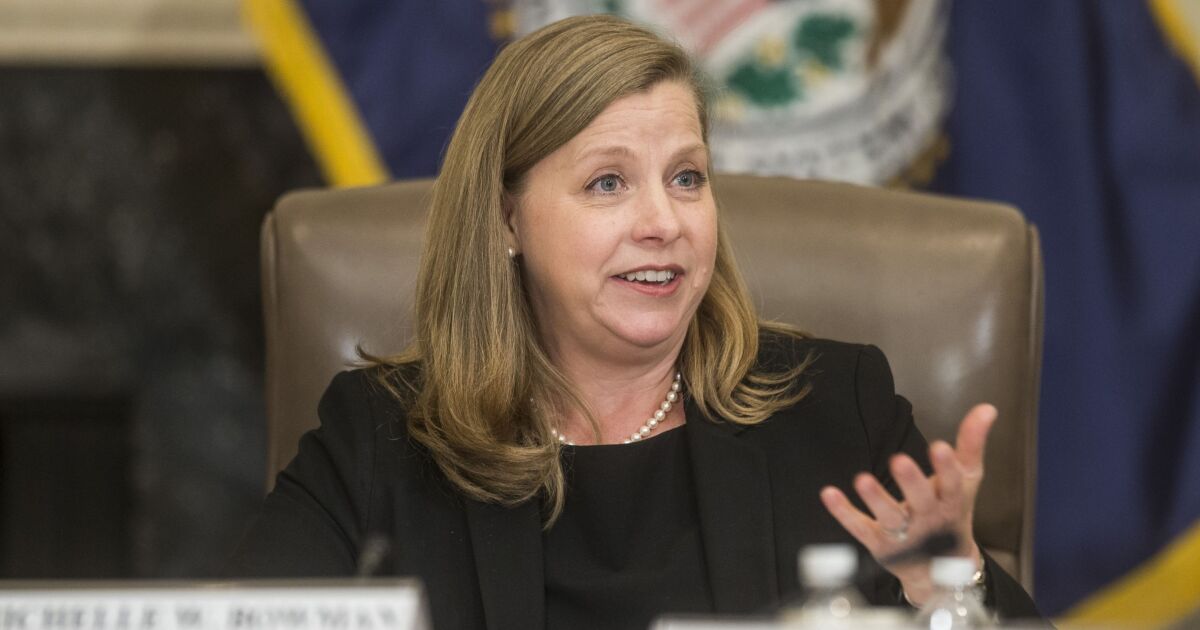
Bank regulators need not adhere strictly to internationally agreed-upon standards as they rethink their
During a forum hosted by the French bank BNP Paribas on Wednesday, Fed Gov. Michelle Bowman said the U.S. central bank — along with the Federal Deposit Insurance Corp. and the Office of the Comptroller of the Currency — should be willing to "deviate" from the risk capital rules laid out by the Basel Committee on Banking Supervision as they
Bowman noted that the Fed's regulatory counterparts, such as the European Central Bank and the Bank of England, have
"Just like in the U.K. and in the EU, the U.S. proposal may need to deviate from the Basel standards to address unique characteristics of the U.S. banking system," she said, "which is entirely appropriate based on these differences."
Bowman's comments come as the Fed, FDIC and OCC consider a rash of
The Basel Committee was formed with the goal of creating a more uniform set of standards for the regulation of big banks around the world. At the time, some jurisdictions, such as Japan, were significantly less stringent in their oversight of risks in their banking sectors. But, policies agreed upon by the committee are nonbinding and subject to national discretion from the participating countries.
The European Union and United Kingdom have used this discretion to adjust their implementations of the most recent Basel framework. The Bank of England, for example, has adjusted its calculation of operational risks to exclude past operational losses, whereas the U.S. proposal uses prior losses to multiply the amount of capital associated with certain risks.
The ECB and Bank of England project that their Basel III endgame implementations would come with significantly lighter new capital requirements for their largest banks than in the United States, with the European agencies projecting increases of 10% and 3.2%, respectively. U.S. regulators, meanwhile, expected their framework to drive up capital requirements by more than 16% for the biggest American banks.
Bowman, who voted against issuing the proposal last year, said Wednesday that "over calibration" was one of several issues with the framework, adding that it goes "beyond the Basel agreement."
The disparity in new capital requirements is not solely driven by matters of national discretion. Some parts of the Basel standards target business models that are more common in the U.S. than other jurisdictions — such as fee-based business models employed by custody banks.
Still, banking industry groups have lamented U.S. regulators' decision to "gold-plate" capital requirements while other regulators have opted to water down policies from Basel. Meanwhile, proponents of stronger regulation say American banks have long faced higher capital requirements than their European counterparts but have remained consistently more profitable.
Fed Chair Jerome Powell and Vice Chair for Supervision Michael Barr — the agency's chief regulator — have both said that significant changes will be made to the Basel III endgame. In congressional testimony last month, Powell said the concept of a full reproposal of the rule was on the table.
The proposal was issued last summer despite dissenting votes from Bowman and Fed Gov.
"Our goal in the U.S. should be a revised rulemaking that can achieve broad consensus," she said. "I've engaged with my colleagues and shared my views about the specific elements of the Basel proposal that I would like to see."



